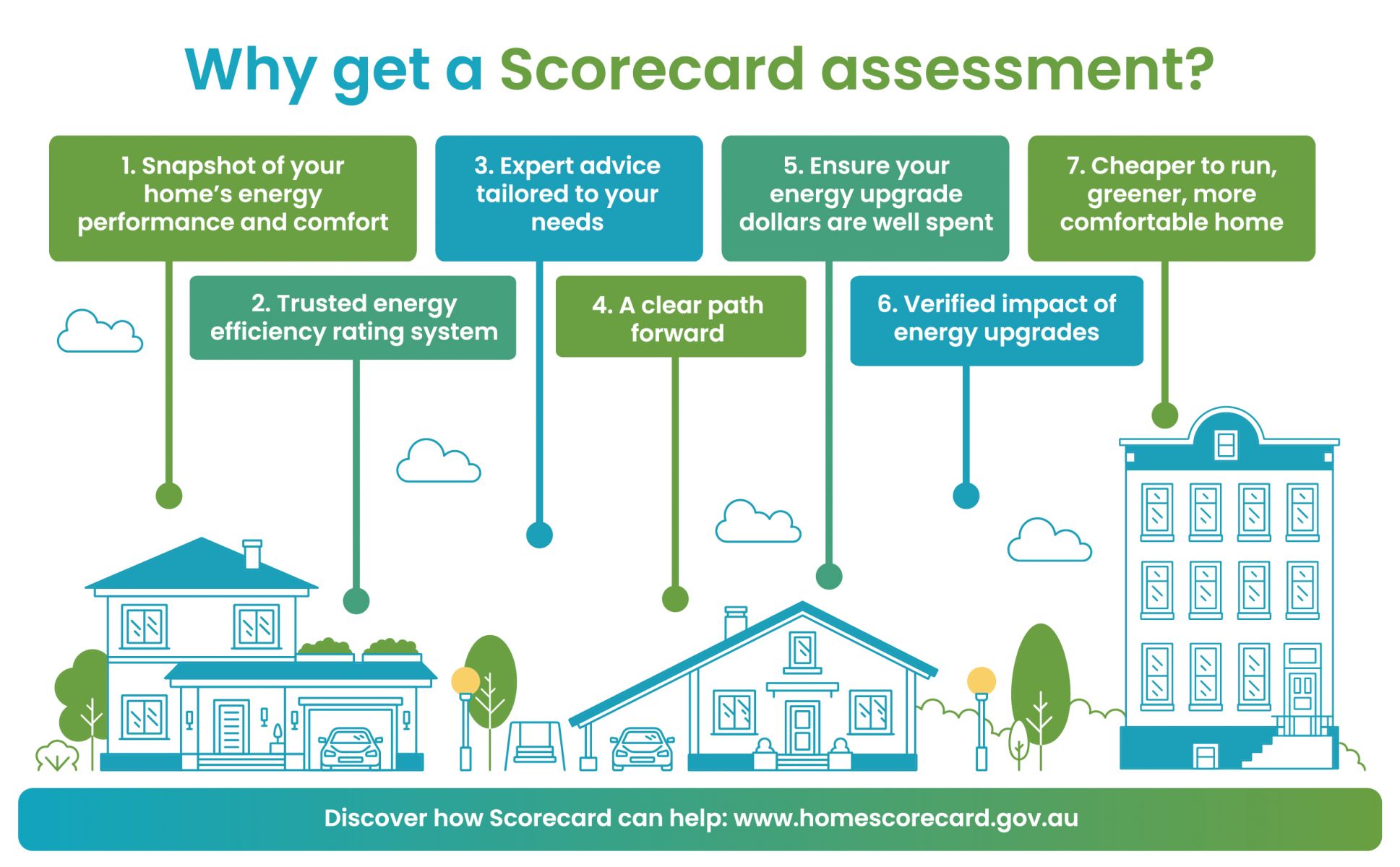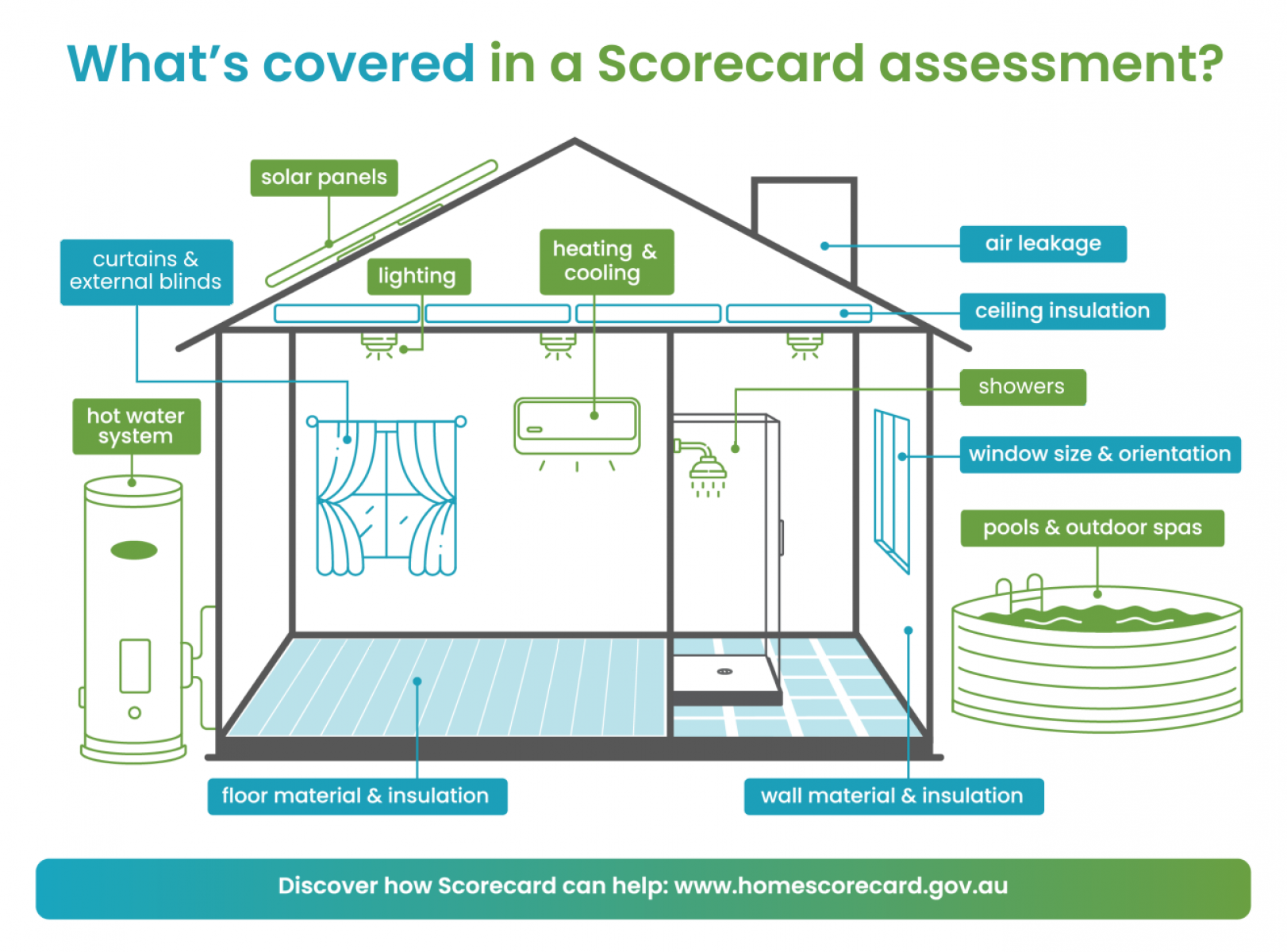On this page:
What is Scorecard?
The national Residential Efficiency Scorecard is an innovative, government-backed program that offers:
- a star rating for your home, just like your washing machine,
- a clear pathway to reduce your energy costs and emissions,
- while making your home more comfortable.
Government-accredited Scorecard assessors are experts in home energy efficiency. Want to reduce your energy bills, make your home more comfortable, go all-electric or plan a renovation? A Scorecard assessor will help you find the best way forward.
So you can live your energy efficient dream, for less!

Why choose an accredited Scorecard assessor?
Government-accredited Scorecard assessors are experts in home energy efficiency. They have qualifications and/or demonstrated skills and experience. In order to be accredited they undertake specialised Scorecard training before passing an exam. This accreditation approach ensures they are equipped with both expert technical knowledge and high-quality customer service skills to help households achieve their goals.
Scorecard assessors have access to ongoing training, expert knowledge, and are subject to quality controls. Assessors are not employed by government and set their own fees.
Learn more about what a Scorecard assessor does, and how to become a Scorecard assessor.

Want to transform your home to all-electric?
Have you been thinking about transitioning your home to all-electric but unsure where to start? With a Scorecard assessment you will get detailed information on your home's energy performance and expert advice from a government-accredited assessor, targeted to your home and individual circumstances.
The Scorecard tool has an all-electric feature which allows Scorecard assessors to manually set the tool to provide electric only upgrade recommendations for their customers.
Scorecard assessors are experts in energy efficiency. If you’re planning to go all-electric, they’ll guide you through the process.
Before your Scorecard assessment
Before you talk to an assessor, work out all the things you would like to achieve through having a Scorecard assessment. Think about your short- and long-term budget. Write down your goals and all the issues you are experiencing in your home, so you can get the most out of your assessment.
Common reasons to have an assessment include:
- high energy bills or your bill has recently increased
- a draughty home or rooms
- an uncomfortable home because it is really cold in winter and/or really hot in summer
- take your home all-electric
- reducing your home’s impact on the environment
- thinking of selling your home and you want to use its energy efficiency rating in your marketing
- thinking of buying a home and want to find out what upgrades would be appropriate
- renting a home and want to reduce your energy bills
- rental provider wanting to upgrade a property to ensure your tenants are comfortable and want to stay in the house.
Many Scorecard assessors offer other services or products that can help you achieve your goals, such as coordinating your upgrades. Some specialise in complex problems, such as finding solutions for heritage homes. If you have a specific need or just want to find out what other advice is available, ask the assessor before you book your appointment.
What happens in a Scorecard assessment?
During your Scorecard assessment, the assessor will visit your home, discuss your goals and conduct a thorough on-site assessment. They will collect data in the government-supported Scorecard tool of your home’s fixed appliances and features, such as:
- How your house is constructed and the materials used.
- The size of each room.
- Window information including: size, the kind of window (double or single glazed, low E, etc.). If there are blinds, curtains, pelmet and the direction the window faces.
- How well insulated your home is.
- The hot water system
- How your home is kept warm in winter and cool in summer.
- The lighting.
- Pool or spa
- Solar power
This data is then used to generate your Scorecard Certificate and informs the conversation with your assessor.
Learn about your privacy and how complaints are handled here.

What does the Scorecard certificate tell me?
Once your assessment is finished, your assessor will provide your Scorecard certificate. Your Scorecard certificate will give you detailed information about your home's:
- energy efficiency star rating out of 10 stars. The higher the stars the lower the costs over a year.
- comfort rating showing how well your home copes with hot and cold weather.
- star rating with and without solar power.
- efficiency ratings for each of the fixed appliances such as heating, cooling, hot water service.
- energy consumption of the fixed appliances over one year.
- greenhouse gas emissions for the fixed appliances over one year.
- provides practical options to improve the home’s energy efficiency.
Your Scorecard assessor will discuss how to use the current appliances and features of your home to improve their efficiency. They will also offer tailored advice to help you achieve your goals and ensure any money you spend on upgrading your home’s energy efficiency will lead to a cheaper to run and more comfortable home.
Learn more about what your Scorecard certificate can tell you about your home.
Scorecard can help with bills
How much does a Scorecard assessment cost?
Your Scorecard assessment may cost between $250 to $500. This cost is set by the assessor and depends on the size of your home, its location and the complexity of the assessment. Assessments are done on houses, units and apartments, even heritage homes. As long as the property has its own heating, cooling, hot water and other services, you can get a Scorecard assessment.
Some local councils and community organisations provide subsidies or rebates for Scorecard assessments, please check with them directly for details.
Whether you own your home, are renting or you are a housing provider a Scorecard assessment can help you understand how to improve your home’s energy efficiency and comfort.
Discounted Scorecard assessments available in Victoria
Victorian households are now able to access rebates for a Residential Efficiency Scorecard assessment under the Victorian Energy Upgrades (VEU) program.
Including a Home Energy Rating Assessment (HERA) activity under the VEU program received widespread community and business support. Scorecard was identified as the only tool that currently meets the required features, and therefore is the first HERA tool to be incentivised. This means householders can contact a VEU registered Scorecard Assessor or Accredited Provider (AP) to access a reduced-cost Scorecard assessment for their home.
Learn more
For more information about Scorecard, download the Introduction to Scorecard factsheet.
Please contact the team to request an accessible version of this factsheet: scorecard@deeca.vic.gov.au
To learn more about how to save on energy bills and improve your home's comfort, download the Improve your home's comfort and efficiency factsheet, now available in multiple languages:
Improve your home's comfort and efficiency - Arabic
Improve your home's comfort and efficiency - English
Improve your home's comfort and efficiency - Greek
Improve your home's comfort and efficiency - Italian
Improve your home's comfort and efficiency - Simplified Chinese
Improve your home's comfort and efficiency - Vietnamese
Page last updated: 03/01/25